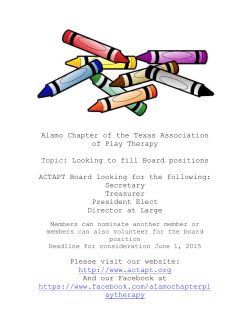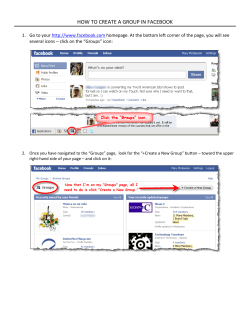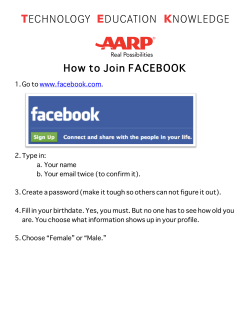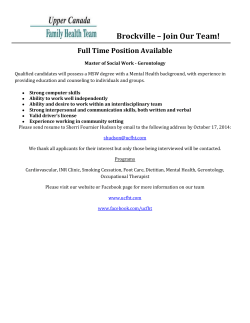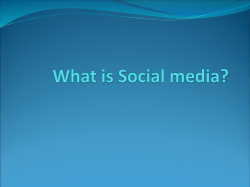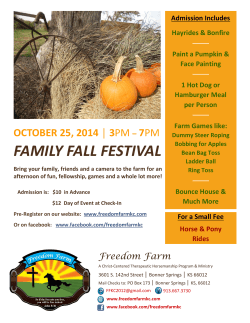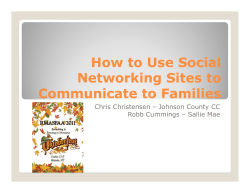
View Full PDF - American Research Thoughts
Volume 1 │ Issue 6 │ April 2015 AMERICAN RESEARCH THOUGHTS ISSN: 2392 – 876X Impact Factor: 2.0178 (UIF) Available online at: www.researchthoughts.us THE GRATIFICATION AND MISUSE PATTERNS OF FACEBOOK USE AMONG UNDERGRADUATE STUDENTS Dhyan Singh Assistant Professor, Govt. Post Graduate College Dharamshala, Himachal Pradesh, India Abstract: This study explored the consequences of Facebook use in the lives of undergraduate students and to what extent this social network site was subjective to their everyday requirements. In this respect 100 college students from Govt. College Dharamshala were randomly chosen and after reviewing several studies on Facebook use, a questionnaire containing 20 close-ended questions was framed and circulated them in their free times. The collected data was tabled and analyzed with the assistance of IBM SPSS 20. Finally, the study summarizes that the undergraduates access Facebook for various purposes in their everyday life in which, academic search, online shopping, developing (social) relations, sharing data, chatting, and killing loneliness are primary. The study also confirms and supports the results of previous studies that the consumption of Facebook influences students’ academic, health and social life both negative and positive manners. It is alarmed that if the dependency of students on Facebook is not taken seriously by parents, teachers and policymakers, it would influence their social relationship, health status, moral attitude and academic performance to a large manner in coming years. Key Words: Facebook, Social Networking Sites, Media, Social Life, college students, effect, health, academic, SPSS. INTRODUCTION Today, college students are one of the extensive users of Facebook and without its existence they feel their social and academic lives are truncated and unfeasible (Debatin et al. 2009). Compared to the past years, today students are networked with each other through the digital communication technology as much as interpersonal communication, (Heiberger & Harper, 2008). They are interconnected with each other 1604 Dhyan Singh- THE GRATIFICATION AND MISUSE PATTERNS OF FACEBOOK USE AMONG UNDERGRADUATE STUDENTS for sharing their everyday experiences, making plans, passing their times, falling in love, and expressing their opinion on different issues with each other comparatively to the face to face communication. They have become more addicted to the internet and have networked their life to a large scale of the digital communication technology. In these several forms of new media, social media particularly Facebook and Twitter are making college students’ lives more interesting and convoluted (Martin, 2008). But on the other hand, experts believe that the readymade information on the internet and social networking sites, making students physically lethargic and mentally dull. These habits are reducing their learning and research capabilities. It has been found that the students who spend more time on social media, the less time they spend socializing with others. The students who use Facebook in excess are also affected in terms of their mental and physical health. Some studies also confirm that due to the long chatting on Facebook students do take their food on appropriate time and not take proper rest. They drink excessive amount of tea, cigarettes, and coffee to remain active. But likely the developed countries the activity of using Facebook among students has been becoming a common thing for some years in India. Despite the opposing of parents and teachers they are using it for dispelling their boredom, making friends, sharing feelings and developing relationships. Most researchers believe that the excessive exposure to Facebook affecting their family and social relationships, health conditions, academic performances, allure them to indulge in premature sexual activities. Facebook addiction is the new term invented by psychiatrists as its addiction will damage the sleeping habits; health and interest in studies and interaction abilities of real life.Social networking media have both negative and positive effect on the academic life of the youth, (S. Kuppuswammy, 2010). According to techrunch.com nearly 85 per cent of college students log on to Facebook every day. Thus Facebook has become an addiction activity for most of the college students. But like other activities, students mostly use Facebook to keep in touch and develop relationship, (Stern and Taylor, 2007).Researchers express their concerns that instead of children concentrating on their homework or studying for a big test the next day, they spend hours looking through pictures, answering their page comments, and chatting with friends. Many scholars have claimed that Facebook lowers academic performance and face-to-face communication is in danger. Continuous use of social networking sites by students are reduced their grades and influence their academic performance negative ways (Banquil et al., 2009). Though, many scholars also found a 1605 AMERICAN RESEARCH THOUGHTS- Volume 1 │ Issue 6 │2015 Dhyan Singh- THE GRATIFICATION AND MISUSE PATTERNS OF FACEBOOK USE AMONG UNDERGRADUATE STUDENTS positive association between using Social Networking Sites and academic performance of the students. It is confirmed that students who use internet scored higher in several important test. (Linda et al. 2006). The social media, today, is a significant tool to exchange the thoughts and get advice from experts. It also provides a creative environment to explore ideas, creativity, and students opinions on national and international social and political issues. Media users are not passive. They play an active part in interpreting and integrating mass media into their personal lives. Unlike other viewpoints, they are responsible for selecting media to meet their requirements and necessities to attain gratification (Katz, Elihu, Jay G. Blumler, and Michael Gurevitch, 1973). Supporting these viewpoints, Nielsen A.C. (2009) also commented that most of the youngsters used social networking media as a key source of information and advice. He further found that 57% of teens claimed that they used Facebook for advice on their everyday activities and solving their difficult problems. While using Facebook is a primary part of the everyday life of college students, there are a lot of threats associated with social networking sites use. There are a number of negative effects on mental health and an exposure to problematic and unlawful content and privacy violations. Social media particularly Facebook is extremely dangerous for students and has become extremely common and widespread in the last four-five years, (M. Trusov, R. E. Bucklin, & K. Pauwels, 2009). Facebook can distract students’ attention and waste their time worthless activities. According to some researchers social media have been influenced the socialization and learning, of college students and has raised some serious issues for educators, parents, researchers and policymakers. Some experts claimed that excessive use of Facebook leading students to many unethical, anti-social and psychological problems. After discussing some significant viewpoints and studies, it is necessary to conduct empirical study on the effects of Facebook on college students’ life in India. LITERATURE REVIEW: FACEBOOK AND COLLEGE STUDENTS Developing countries like India are a fundamental source of growth for Facebook, with increasing number of users logging onto the site. Monthly active users in India stood at 1606 AMERICAN RESEARCH THOUGHTS- Volume 1 │ Issue 6 │2015 Dhyan Singh- THE GRATIFICATION AND MISUSE PATTERNS OF FACEBOOK USE AMONG UNDERGRADUATE STUDENTS 93 million at the end of December 2013. There are 1.23 billion Facebook users in worldwide, 39% more from the year-ago period. A study carried out by Pempek, Yermolayeva & Calvert (2009) concluded that Facebook was a part of students’ everyday life. It did not matter how busy they were. Many other researchers have extended similar conclusions and drew attention to the regular use of social media by college students. Stern and Taylor (2007) conducted a survey among 364 university students and investigated that only a small number of Facebook users tried to meet new and that most of college students used it to maintain already existing relationships. Lenheart A. (2009) observed that students were at risk as they came to contact with unwanted people and content on Facebook because of their immature age to judge good and bad and less pressure of their parents. This early exposure to the things persuaded them into premature sex. Sulaiman Ainin, M. Muzamil Naqshbandi, Sedigheh Moghavvemi, and Noor Ismawati Jaafar (2015) disclosed a positive relationship between students’ Academic Performance and Facebook usage. They found that if the students used more Facebook they perceived they performed better. While a study conducted by Edson C. Tandoc Jr., Patrick Ferrucci, Margaret Duffy (2015) found no straight association between Facebook use and depression, but when Facebook was used for surveillance developed depression symptoms. They also noted that heavy Facebook users had a higher level of Facebook envy than light users. Shah et al. (2001) proposed that students who use Facebook were influenced by the internet negatively. They were positively affected by the informative use of internet while having profound effect of recreational usage of internet on them. In the opinion of Kuppuswamy and Shankar (2010) social network sites seize attention of the students and then distracts them towards non-academic, inappropriate activities and useless chatting. Lenhart & Madden (2007) expressed that social media sites support a virtual life that was mostly unreal. Students made fake accounts and unreal relations with one another. Students have their hidden objectives because they want to be famous. Hassan Farooqi et al. (2013) expressed that adolescents were willing to compromise their health, social life and study for amusement and entertainment or whatever gratification they got after using Facebook. They also observed that majority of participants showed various signs of Facebook obsession, some youngsters did not realise it but when some realised they were not able to leave it. Study concluded that majority of respondents were highly addicted. 1607 AMERICAN RESEARCH THOUGHTS- Volume 1 │ Issue 6 │2015 Dhyan Singh- THE GRATIFICATION AND MISUSE PATTERNS OF FACEBOOK USE AMONG UNDERGRADUATE STUDENTS Of all the social network sites, Facebook is the most popular and most commonly used amongst college students. Tavis Glassman, Aubrey Whewell, and Diana M Reindl (2012) studied a sample of 445 college students and found 88% respondents had an active Facebook account while 33% were engaged in high-risk drinking. They researchers found a significant relationship between high-risk drinking habit and posting alcohol consumption pictures. They recommended social scientists to conduct more research on this topic. In developing and developed countries the information technology is used differently. Sana Rouis (2012) did not find any negative effect of Facebook on Tunisian students’ academic performances while it has increased their relations with their family. And this increased level of satisfaction enhanced their academic performances. But they found some lower satisfaction level among their friends. Donghee Yvette Wohn and Robert LaRose (2014) studied that Facebook use neither contributed to the feeling of loneliness nor it changed this feeling. But they noted a direct negative connection between academic motivation and loneliness. The researchers concluded that too much time spent on Facebook significantly associated with lower academic performance was just a high perception. Neither consistent nor habitual use of Facebook was straightly associated with perceived academic achievements. They blamed popular media for distorting the image of Facebook and argued that Facebook contributed to social adjustment in place of enhancing loneliness among college students. PROBLEM STATEMENT This study was aimed to determining the impact of Facebook; a social networking website founded on February 4, 2004 by Mark Zuckerberg, on the social behaviour and everyday activities of the college students at Govt. P.G. College Dharamshala, India. RESEARCH QUESTIONS 1. What are the main effects of Facebook use on the lives of college students? 2. To what extent Facebook influence their daily activities? 3. Is Facebook helpful in the overall development of college students? 4. For what purposes students use Facebook? 1608 AMERICAN RESEARCH THOUGHTS- Volume 1 │ Issue 6 │2015 Dhyan Singh- THE GRATIFICATION AND MISUSE PATTERNS OF FACEBOOK USE AMONG UNDERGRADUATE STUDENTS RESEARCH METHODOLOGY Data Collection Method In this quantitative study both primary and secondary data were comprised. The primary data for the study was collected through the questionnaires. For secondary data, library, govt. online and offline records were consulted. A large amount of data was also collected from the published research studies for reviewing the literature and justifying the study. Sample Designing A sample of 100 students was randomly selected from Govt. Post Graduate College Dharamshala, Himachal. Firstly it was find out that how many students used Facebook and then a close ended questionnaire containing 20 questions was distributed to the students in their spare times. The collected data was carefully assessed through using the statistical software i.e. SPSS IBM 20 and the results were taken as they were required for the analysis of this study. Data Analysis Techniques The descriptive statistics method was used to analyse the gathered data. Firstly, the data was entered into the Statistical Package for Social Science (SPSS) Software and then frequency command was given for analysing and calculating the results. FINDINGS OF THE STUDY Valid One to three times 51 51.0 51.0 51.0 Four to six times 20 20.0 20.0 71.0 Seven to nine times 13 13.0 13.0 84.0 Ten times or more 16 16.0 16.0 100.0 100 100.0 100.0 Total Table 1: Frequency of using Facebook everyday The results of above table display that a large part of the sample was using Facebook daily for around 1-2 hours. And 20% of respondents accepted that they used the Facebook for four to six times in a day while 16% and 13% people expressed that they had login seven to nine times and ten times or more respectively in 24-hour. 1609 AMERICAN RESEARCH THOUGHTS- Volume 1 │ Issue 6 │2015 Dhyan Singh- THE GRATIFICATION AND MISUSE PATTERNS OF FACEBOOK USE AMONG UNDERGRADUATE STUDENTS Frequency Percent Valid Percent Cumulative Percent Valid 1 to 10 minutes 34 34.0 34.0 34.0 10 to 15 minutes 35 35.0 35.0 69.0 15 to 30 minutes 10 10.0 10.0 79.0 30 to 45 minutes 14 14.0 14.0 93.0 45 to 60 minutes 3 3.0 3.0 96.0 One hour to 01:15 minutes 4 4.0 4.0 100.0 100 100.0 100.0 Total Table 2: Length of every visit The results of above table displayed that 35% of the students used Facebook for 10 to 15 minutes in their every visit. Similarly, around 34% of participants login Facebook for one to ten minutes in every visit. Some of the students used the Facebook for 15 to 30 minutes, 30 to 45 minutes, 45 to 60 minutes and one hour to one and quarter-hour. Preferred location for using the Facebook As depicted in the table below most of the respondents used the Facebook at their home while 17% of the sample used it in their bedroom. Only a little percentage of the sample stated that they used Facebook in college. Frequency Percent College Valid Valid Percent Cumulative Percent 3 3.0 3.0 3.0 Home 80 80.0 80.0 83.0 Bedroom 17 17.0 17.0 100.0 100 100.0 100.0 Total Table 3: Location of use Facebook mostly Frequency Percent Valid Percent Cumulative Percent Valid Keeping in touch with friends 22 22.0 22.0 22.0 Chatting 19 19.0 19.0 41.0 Getting information about friends 2 2.0 2.0 43.0 Telling people about myself 9 9.0 9.0 52.0 13 13.0 13.0 65.0 3 3.0 3.0 68.0 Uploading and Following photos, videos, events etc. Getting news 1610 AMERICAN RESEARCH THOUGHTS- Volume 1 │ Issue 6 │2015 Dhyan Singh- THE GRATIFICATION AND MISUSE PATTERNS OF FACEBOOK USE AMONG UNDERGRADUATE STUDENTS Spending time 4 4.0 4.0 72.0 Making new friends 12 12.0 12.0 84.0 To kill loneliness 16 16.0 16.0 100.0 100 100.0 100.0 Total Table 4: Objective of using the Facebook College students login Facebook for different purposes with different reasons. Majority of the students used Facebook to keep in touch with their friends while 19% of sample used Facebook for chatting with friends. Around 16% respondents went to Facebook for avoiding their loneliness. Sharing and following was also one of the prime factors for using Facebook. Frequency Valid Percent Valid Percent Cumulative Percent Sometimes 61 61.0 61.0 61.0 Never 33 33.0 33.0 94.0 6 6.0 6.0 100.0 100 100.0 100.0 Frequently Total Table 5: Habit of checking Facebook while speaking with people As shown in table no. 5 that 61% of students checked occasionally their Facebook account for message/updating while talking to others. Only 33% of total sample denied to doing this manner while 6% were doing frequently the activity. Checking Facebook till late night The following table indicated that 56% of college students accepted that they checked their Facebook for updates till late night. A 40% percent of sample told that they did not check the Facebook late night for any new message or other updating information. A little percentage (4%) checked frequently the Facebook account till late night for new comment or message. Frequency Valid Percent Valid Percent Cumulative Percent Never 40 40.0 40.0 40.0 Sometimes 56 56.0 56.0 96.0 Frequently 4 4.0 4.0 100.0 100 100.0 100.0 Total Table 6: Use of Facebook until midnight 1611 AMERICAN RESEARCH THOUGHTS- Volume 1 │ Issue 6 │2015 Dhyan Singh- THE GRATIFICATION AND MISUSE PATTERNS OF FACEBOOK USE AMONG UNDERGRADUATE STUDENTS Frequency Valid Percent Valid Percent Cumulative Percent Feel more active 17 17.0 17.0 17.0 Feeling lethargic 35 35.0 35.0 52.0 Feel no change 48 48.0 48.0 100.0 100 100.0 100.0 Total Table 7: Mood or behaviour after using of Facebook The finding of the study asserted that most of the students did not feel any physical and mental changes in their mood or behaviour after using Facebook. Besides this, only 35 participants felt some lethargic feeling in their mood. And positively 17% of sample experienced some lively and energetic feeling in their behaviour. Frequency Valid Percent Valid Percent Cumulative Percent Never 21 21.0 21.0 21.0 Sometimes 20 20.0 20.0 41.0 Frequently 59 59.0 59.0 100.0 100 100.0 100.0 Total Table 8: Forgetting or skipping meal Frequency Valid Percent Valid Percent Cumulative Percent Never 20 20.0 20.0 20.0 Sometimes 25 25.0 25.0 45.0 Frequently 55 55.0 55.0 100.0 100 100.0 100.0 Total Table 9: Discontentment and depression after checking profile of other people Nearly 55% participants agreed of feeling always some discontentment and depression after checking the profile of people on Facebook. Merely, 20% students had not any such feeling. Frequency Valid Percent Valid Percent Cumulative Percent Disturbance 42 42.0 42.0 42.0 No effect 58 58.0 58.0 100.0 100 100.0 100.0 Total Table 10: Impact on study 1612 AMERICAN RESEARCH THOUGHTS- Volume 1 │ Issue 6 │2015 Dhyan Singh- THE GRATIFICATION AND MISUSE PATTERNS OF FACEBOOK USE AMONG UNDERGRADUATE STUDENTS Majority of students denied any negative effect of Facebook usage on their studies while 42% of respondents accepted that Facebook usage influenced their study negatively. Frequency Percent Valid Percent Cumulative Percent Valid Feel no change 31 31.0 31.0 31.0 Feel something is missing 54 54.0 54.0 85.0 Difficult to spend the day 15 15.0 15.0 100.0 100 100.0 100.0 Total Table 11: Experience without surfing Facebook A large portion of the sample claimed that they felt missing something in the whole day without login Facebook. Whereas, 15% of students experienced difficult to spend their day without Facebook as compared 31% who felt no importance if they did not login. Variables Never Sometimes Frequently Feel back pain 30 49 21 Feel shoulder 58 33 9 Feel wrist pain 51 37 12 Feel headache 53 39 8 Feel eye irritation 22 65 13 Table 12: Adverse effect on health Similarly other negative effects, Facebook also influences the health status of students. Most of the participant sometimes felt irritation in their eyes while or after using the Facebook. Many respondents confirmed that they sometimes experienced back pain, shoulder, and headache and wrist pain during or after surfing Facebook. Some students frequently felt these physical symptoms. DISCUSSION AND CONCLUSION Because of the social, economic and psychological factors, the amount frequency of Facebook use is not same among the college students. They use it minimum at least three times for 10 minutes in one day and maximum more than one hour a day. Mostly, they use it at their home for remaining in touch with their friends, gossiping and killing 1613 AMERICAN RESEARCH THOUGHTS- Volume 1 │ Issue 6 │2015 Dhyan Singh- THE GRATIFICATION AND MISUSE PATTERNS OF FACEBOOK USE AMONG UNDERGRADUATE STUDENTS their aloneness. But their occasional and frequent login of Facebook is influencing all their life activities. They do not sleep well at night, use Facebook instead of studying, ignore their foods, overlook others and do not go outside for other social activities. It is summarised that Facebook psychologically making students’ life stressful and discontent. When they do not get any comment or like for their post, they become depressed and it forces them to think differently. Today, Facebook is playing a vital role in developing and destroying relationship, shaping children opinion about world, and motivating their attitude and behaviour. Therefore, it is the responsibility of parents to look at what their children are doing on Facebook in the closed doors. Countries like China and others have been blocked the access of Facebook in their lands. It is also need to formulate some strict policies in India. Nicole E. Hurt, Gregory S. Moss, Christen L. Bradley, Lincoln R. Larson, Matthew D. Lovelace, and Luanna B. Prevost (2012) observed a significant change in students’ attitudes. The researchers also found the students who used Facebook were well acquainted with their classmates, and learnt more study. So we can say Facebook may help to increase college student engagement in certain learning contexts by cultivating classroom community and stimulating intellectual discourse. Even some other study also point out that internet sites such as Facebook offers an innovative educational instrumental for engaging students and motivate them for intelligent talks (Palmer, Holt, & Bray, 2007). In India, Facebook or Internet was introduced only five to six years back in, but in this short span of times it has changed the way people interact, feel, and see the world. Till today a number of studies with various objectives have been conducted to measure the impact of Facebook on college students. This study finds that the most of the students have become addicted to Facebook and cannot spend their time without it. However, persistent with previous studies this study also concluded that students mostly used Facebook for connecting with people, sharing and killing aloneness rather than other creative or educational objectives. Students use Facebook especially to have fun, to contact with friends and to follow photos, videos, events etc. (Pempek et al. 2009). Consumption of excessive Facebook affects students all daily activities. They ignore their meals, feel some physical restlessness and find less times for study. According to the study of Kim & Kim (2002) addiction is well-known to destroy people and their interactions. Addiction of internet and social media is no exception in this 1614 AMERICAN RESEARCH THOUGHTS- Volume 1 │ Issue 6 │2015 Dhyan Singh- THE GRATIFICATION AND MISUSE PATTERNS OF FACEBOOK USE AMONG UNDERGRADUATE STUDENTS respect. Thus, it is confirmed that Facebook also deteriorate the face to face communication and family relationships. This study has various limitations but here I will discuss only a few important constraints. Firstly, one hundred samples of students are not sufficient to measure the impact of Facebook use. Studying bigger sample may give more comprehensible and profound results. The second limitation was its confined objectives. There is a need to conduct a correlative study in which parents, children and teachers should be involved. In essence, the study did not explain the gender separately and not included family background. REFERENCES 1. Amanda Lenhart (2010), ‘Teens and Sexting’, Washington, DC: Pew Research Center; 2009.Available at: http://pewinternet.org/Reports/2009/Teens-and- Sexting.aspx.\ 2. Amanda Lenhart, and Mary Madden (2007). Teens, Privacy & online social networks: How teens manage their online identities and personal information in the age of My Space. Washington, Pew Internet & American Life Project.http://www.pewinternet.org/files/oldmedia/Files/Reports/2007/PIP_Teens_Privacy_SNS_Report_Final.pdf.pdf. 3. Anonymous. (2010). Student Grades not Affected by Social Networking. Retrieved from University of New Hampshire: http://www.newswise.com/articles/student-grades-not-affected-by-socialnetworking-new-researchfinds. 4. Bernhard Debatin, Jennette P. Lovejoy, Ann-Kathrin Horn M. A. Brittany N. Hughes, Ann‐Kathrin Horn (2009). Facebook and online Privacy: Attitudes, Behaviors, and Unintended Consequences Journal of Computer-Mediated Communication; 15(1):83 - 108. 5. Edson C. Tandoc Jr., Patrick Ferrucci, Margaret Duffy (2015) Facebook use, envy, and depression among college students: Is facebooking depressing? Computers in Human Behavior 43 (2015) 139–146 6. Katz, Elihu, Jay G. Blumler, and Michael Gurevitch. "Uses and Gratifications Research. "The Public Opinion Quarterly 4th ser. 37 (1973–1974): 509-23. JSTOR 1615 AMERICAN RESEARCH THOUGHTS- Volume 1 │ Issue 6 │2015 Dhyan Singh- THE GRATIFICATION AND MISUSE PATTERNS OF FACEBOOK USE AMONG UNDERGRADUATE STUDENTS 7. Hassan Farooqi et al. (2013) Effect of Facebook on the life of Medical University students, International Archives of Medicine 10/2013; 6(1):40 8. Greg Heiberger, Ruth Harper. (2008). Have you facebooked Astin lately? Using technology to increase student involvement. New Directions for Student Services, 11/2008; 2008(124):19 - 35. 9. Kuppuswamy, S., & Narayan, P. (2010). The Impact of Social Networking Websites on the Education of Youth. International Journal of Virtual Communities and Social Networking (IJVCSN), 2(1), 67-79. 10. Michael Trusov, Randolph E. Bucklin, Koen and H. Pauwels, (2009) Effects of Word of Mouth Versus Traditional Marketing: Findings from an Internet Social Networking Site, Journal of Marketing, Vol. 73, Issue 5, page 90-102, September 2009. 11. Moreno M.A., Briner LR, Williams A, Walker L, Christakis DA. (2009). "Real Use or Real Cool": Adolescents speak out about Displayed Alcohol References on Social Networking Web Sites". J Adolesc Health. 45 (4): 420–421. 12. Nicole E. Hurt, Gregory S. Moss, Christen L. Bradley, Lincoln R. Larson, Matthew D. Lovelace, and Luanna B. Prevost (2012), The ‘Facebook’ Effect: College Students’ Perceptions of Online Discussions in the Age of Social Networking, Vol. 6, No. 2 13. Sana Rouis 2012 Impact of Cognition absorption on Facebook on Studensts’ acievement Cyberpsychology, Behavior, and Social Networking; 15(6):296-303. 14. Shah DV, Kwak N, Holbert RL (2001), Connecting and disconnecting with civic life: Patterns of Internet use and the production of social capital. Polit. Communication., 18: 141-162. 15. Stern, L. A., & Taylor, K. (2007). Social networking on Facebook. Journal of the Communication, Speech & Theatre Association of North Dakota, 20, 9-20. 16. Sulaiman Ainin, M. Muzamil Naqshbandi, Sedigheh Moghavvemi,and Noor Ismawati Jaafar 2015) Facebook usage, socialization and academic performance, Computers & Education (Journal Elsevier); 83:64-73. 17. Sunwoo Kim (2002). A Study of Internet Addiction: Status, Causes, and Remedies, Journal of Korean Home Economics Association English Edition.; 3(1):1-19. 1616 AMERICAN RESEARCH THOUGHTS- Volume 1 │ Issue 6 │2015 Dhyan Singh- THE GRATIFICATION AND MISUSE PATTERNS OF FACEBOOK USE AMONG UNDERGRADUATE STUDENTS 18. The Nielsen Company. (2009). How Teens use Media: A Nielsen report on the myths and realities of teen media trends. Retrieved on May 30, 2011 from website:http://www.nielsen.com/content/corporate/us/en/search.html? 19. Tavis Glassman, Aubrey Whewell, Diana M Reindl (2012) Implications for college students posting pictures of themselves drinking alcohol on Facebook Journal of alcohol and drug education 56:38-58. 20. Tiffany A. Pempek, Yevdokiya A. Yermolayeva, and Sandra L. Calvert. (2009). College students' social networking experiences on Facebook. Journal of Applied Developmental Psychology, 30, 227-238. 21. Palmer, S., Holt, D., & Bray, S. (2008). Does the discussion help? The impact of a formally assessed online discussion on final student results. British Journal of Educational Technology, 39(5), 847-858. 1617 AMERICAN RESEARCH THOUGHTS- Volume 1 │ Issue 6 │2015
© Copyright 2025
